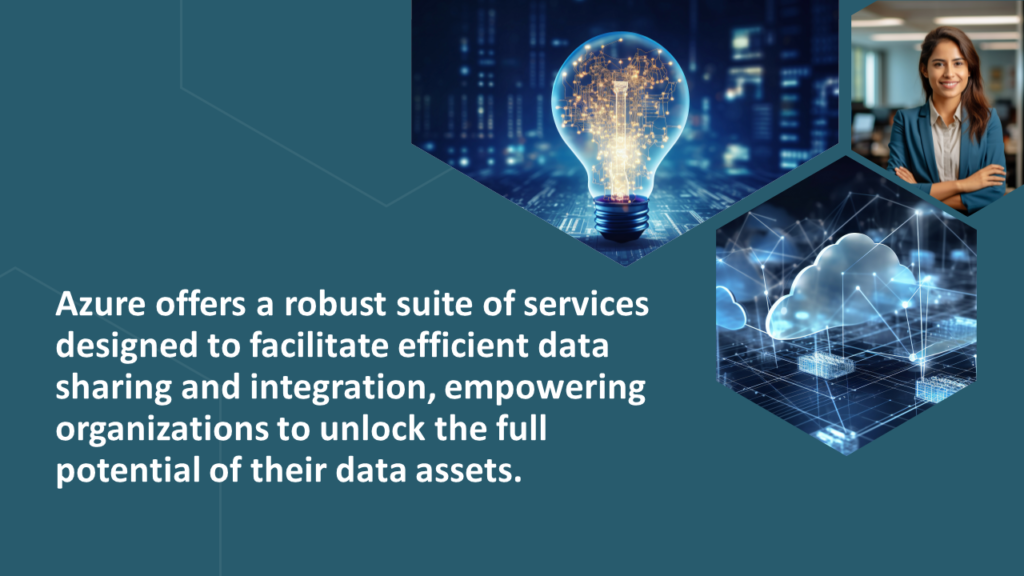Seamless Data Sharing with Azure Services
In today’s digitally-driven world, the ability to share data efficiently across multiple systems is essential for businesses to thrive. Whether it’s synchronizing customer information between CRM platforms and marketing automation tools or ensuring real-time inventory updates across e-commerce platforms and warehouse management systems, seamless data sharing is the backbone of modern operations.
Fortunately, Microsoft offers a comprehensive suite of Azure services and tools that empower developers to build robust applications capable of facilitating seamless data exchange. Let’s delve deeper into the importance of data sharing across systems and explore how Azure serves as an ideal platform for building such applications.
Understanding Data Sharing Needs
Before embarking on the journey of building data sharing applications, it’s crucial to understand the specific data that needs to be shared and the systems that require access to it. As technology advances, data becomes increasingly pervasive and paramount. Businesses need to access, manage, and share data within their line of business applications. The process of data identification and then building a system to share it is crucial.
This involves conducting a thorough analysis of organizational workflows, identifying key data points, and mapping out the interactions between different systems. By gaining clarity on data sharing requirements, businesses can ensure that information flows smoothly across the entire ecosystem. It eventually drives operational efficiency and enables informed decision-making.
Overview of Azure Services for Data Sharing
The ability to share data seamlessly across various platforms and systems is essential for businesses striving to stay competitive. Azure offers a robust suite of services designed to facilitate efficient data sharing and integration, empowering organizations to unlock the full potential of their data assets. Let’s explore the diverse range of Azure services tailored specifically for data sharing:
Azure Blob Storage
This scalable object storage solution is perfect for storing unstructured data such as images, videos, and documents. With features like geo-replication and lifecycle management, Azure Blob Storage provides a reliable foundation for storing and sharing large volumes of data.
Azure SQL Database
As a fully managed relational database service, Azure SQL Database offers high-performance, scalable storage for structured data. With built-in intelligence and advanced security features, it’s an ideal choice for applications that require real-time data access and seamless integration with other Azure services.
Azure Data Lake
Designed for big data analytics and processing, Azure Data Lake Storage Gen2 combines the scalability of Azure Blob Storage with the power of Hadoop Distributed File System (HDFS). With support for various data types and integration with Azure analytics services like Azure Databricks and Azure Synapse Analytics, it enables organizations to unlock valuable insights from their data.
Azure API Management
This service simplifies the process of creating, publishing, and managing APIs, making it easier for developers to expose data and functionality to internal and external stakeholders. By providing features like authentication, rate limiting, and analytics, Azure API Management ensures secure and reliable access to shared data.
Azure Data Explorer
As a fast and highly scalable analytics service, Azure Data Explorer enables organizations to perform real-time data exploration and analysis. With support for complex queries and interactive visualizations, it’s well-suited for applications that require rapid insights from streaming data sources.
Azure Logic Apps
Azure Logic Apps provides a low-code platform for building scalable workflows and integrating data and services across cloud and on-premises environments. It supports hundreds of connectors for seamless integration with various SaaS applications, services, and protocols.
Azure Data Factory
This service enables users to create, schedule, and manage data pipelines for orchestrating and automating data movement and transformation across various sources and destinations. Azure Data Factory also provides monitoring and management features, allowing users to track pipeline performance, troubleshoot issues, and optimize data workflows for enhanced efficiency and reliability.
Azure Stream Analytics
With Azure Stream Analytics, users can create and deploy real-time analytics solutions without managing infrastructure. The service supports SQL-like queries, allowing users to easily define complex transformations, filters, aggregations, and correlations on streaming data.
Designing an Azure Application for Data Sharing
When designing an Azure application for data sharing, several architectural considerations come into play. It’s essential to assess factors such as data volume, velocity, variety, and veracity to determine the most suitable Azure services for the task at hand.
For example, applications dealing with large volumes of unstructured data may benefit from Azure Blob Storage, while those requiring complex querying capabilities may opt for Azure SQL Database. Additionally, designing robust APIs is critical for facilitating seamless data access and sharing across systems. By adhering to RESTful principles and implementing proper authentication mechanisms, developers can ensure that data is exchanged securely and efficiently.
Furthermore, the choice of Azure services should align with the specific requirements and objectives of the application. For instance, applications focused on real-time data processing and analysis might leverage Azure Stream Analytics to handle streaming data effectively. Moreover, considerations regarding data security and compliance standards cannot be overlooked. Implementing encryption techniques, role-based access controls, and auditing mechanisms are vital components of a comprehensive data sharing architecture on Azure. By incorporating these elements into the design phase, organizations can foster trust, mitigate risks, and uphold regulatory compliance, thereby fortifying their data sharing infrastructure for the long term.
Azure Services Implementation
The implementation phase involves setting up Azure services, configuring access controls, and implementing data ingestion and transformation pipelines. This process requires careful planning and coordination to ensure that data flows smoothly between systems.
For example, organizations may leverage Azure Data Factory to orchestrate data movement and transformation tasks, ensuring that data is cleansed, formatted, and enriched before being shared with downstream systems. Similarly, implementing data access APIs using Azure API Management allows developers to define policies for authentication, authorization, and rate limiting, ensuring that shared data is accessed responsibly and securely.
Moreover, during the implementation phase, organizations should focus on optimizing the performance and scalability of their Azure services to meet the demands of data sharing across systems. This involves fine-tuning data processing workflows, optimizing data storage configurations, and monitoring resource utilization to identify potential bottlenecks or performance issues. Additionally, organizations should establish robust data governance policies and practices to ensure data quality, integrity, and compliance throughout the data sharing process. By implementing comprehensive monitoring, optimization, and governance strategies, organizations can maximize the effectiveness and efficiency of their Azure services for data sharing initiatives.
Integrating Systems for Seamless Data Sharing
In today’s interconnected ecosystem, seamless system integration is essential for maximizing the value of shared data. Whether it’s integrating with third-party SaaS applications, legacy on-premises systems, or partner APIs, organizations must establish robust connections and implement data exchange protocols that enable seamless interoperability.
Establishing effective communication channels and protocols is paramount for ensuring smooth data exchange and interoperability between systems. Azure provides a range of communication tools and protocols that facilitate seamless integration and data flow. For instance, Azure Logic Apps enables organizations to automate workflows and integrate processes across different applications and services, streamlining data exchange and enhancing operational efficiency. Additionally, Azure Event Grid offers a scalable and event-driven messaging platform that allows real-time communication between diverse systems and services, enabling timely responses to critical events and updates. Moreover, Azure Service Bus provides reliable messaging and communication between distributed systems, ensuring message delivery and enabling decoupled communication patterns. By leveraging these Azure services and adopting standardized communication protocols, organizations can establish robust connections and facilitate smooth data exchange across their ecosystem, ultimately driving innovation and accelerating business growth.
Security and Compliance Considerations
Security and compliance are paramount when sharing data across systems, particularly in regulated industries such as healthcare, finance, and government. Azure offers a wide range of built-in security features and compliance certifications to help organizations meet their data protection requirements.
This includes encryption at rest and in transit, identity and access management with Microsoft Entra ID, and regulatory compliance with standards like GDPR, HIPAA, and SOC. By implementing robust security controls and adhering to best practices, organizations can mitigate risks and protect sensitive data from unauthorized access or disclosure.
Advanced Data Sharing with i3solutions
Building robust applications for seamless data sharing across systems is essential for modern businesses seeking to leverage the full potential of their data assets. By harnessing the power of Azure’s comprehensive suite of services and adhering to best practices in architecture, security, and compliance, organizations can unlock new opportunities for innovation, collaboration, and growth. And partnering with an experienced cloud solution provider like i3solutions is a strategic step in achieving these goals.
i3solutions brings deep expertise in Azure architecture, implementation, and optimization, empowering organizations to design and deploy tailored solutions for their data sharing needs. With a focus on innovation, reliability, and customer satisfaction, i3solutions collaborates closely with clients to understand their unique requirements and deliver scalable, resilient, and secure Azure-based data sharing applications. By partnering with i3solutions, organizations gain access to a trusted advisor and a dedicated team of cloud professionals who are committed to driving success and enabling digital transformation. Together, organizations can harness the full potential of Azure services to build resilient and future-ready applications that fuel business growth and competitive advantage in today’s dynamic marketplace. Contact i3solutions today to get started!
Leave a Comment




